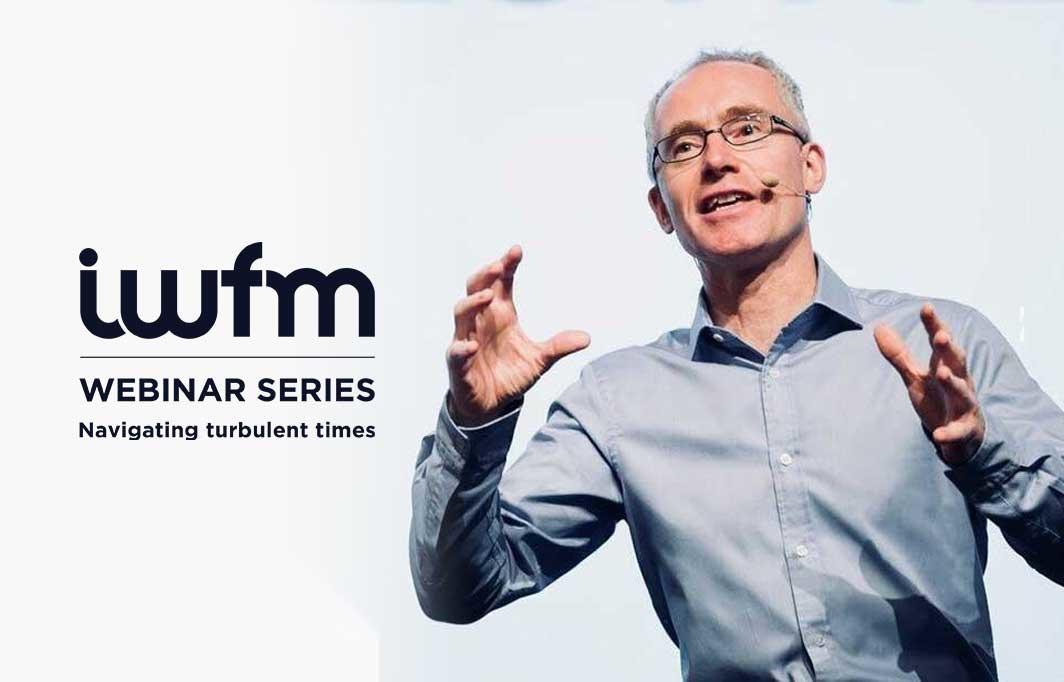What we learned from Marcus Child in ‘Leading for resilience and resourcefulness after COVID-19’
News
- General news
26 June 2020

Episode nine of IWFM’s regular webinar series ‘Navigating turbulent times’ featured multi-award-winning speaker Marcus Child, discussing how leaders can adopt a ‘reset’ mindset to successfully rebound from the impact of the COVID-19 pandemic.
Despite all of its challenges, the crisis presents a unique opportunity for leaders to take a step back and reset their approach. It’s a chance to nurture agility, develop entrepreneurial thinking and reset the culture of our organisations. It’s a time to reflect on the true values and purpose of our businesses, galvanising teams into new ways of working and enhancing how we serve our people, customers and communities. In doing so, we can win fresh levels of engagement and respect, and build strong foundations for building better business in the medium and long term.
Key takeaways:
Communicating with yourself and your teams in times of crisis
How we talk to ourselves and our teams is always important, but even more so in challenging times. Our ‘state’ impacts how we perform and is ultimately driven by our ‘self-talk’. When we see people performing well, whether on a sports field or in a boardroom, chances are they are in a composed and controlled state, speaking well to themselves and driving their performance in a virtuous cycle. And of course, the opposite is also true.
Our state is also impacted by the support and encouragement we receive from others. A great leader can step in and influence the way their people view themselves and a key responsibility of leaders is to encourage and support their people. As we move through the next few months, those that do this well will reap the benefits in the long term with a positive, motivated and high-performing team.
Enabling a positive, can-do soundtrack to your business
The crisis has infiltrated all facets of life, creating a great deal of external noise and fear. It’s important that leaders find a way of looking for the good and drive a positive spirit among their teams, rather than defaulting to doubt or negativity. There are a number of key attributes of successful leaders. Firstly, ambition: a drive to get to the finish line and help an organisation achieve its goals. Secondly, confidence: being confident in yourself inspires other to have trust in you. Finally, energy: great leaders are those that turn up, try new things and bring a positive energy to the task at hand.
Promoting resilience
Resilience is the ability to return to former shape after receiving a blow. It will be vital for organisations to be resilient as we face the immediate challenges of the crisis and prepare for those to come. Resilience is made up of five key fibres:
- physical: physical strength and good health has an impact on our mental health. Organisations should have a culture that promotes health and wellness – from fitness and nutrition support to local initiatives such as charity work for employees to get involved with
- mental: mental resilience involves having clear plans, ideas and strategies to follow, which allow us to think clearly under pressure and make good decisions. Organisations should ensure they have clear plans in place and that these are well communicated to employees to allow them to be confident in the rebound effort
- emotional: being in a positive, happy emotional state puts us in a better position to make good decisions. Organisations should focus on driving a positive working culture, recognising efforts, investing time in coaching and keeping employee ‘self-talk’ high
- social: we are stronger together than as individuals. Those with a strong support network are better able to build resilience in the face of challenges. Organisations should focus on building team unity – hosting team meetings, communicating regularly and encouraging employees to celebrate their own and others successes
- spiritual: this is arguably the most important driver and it involves having a clear vision and purpose. Leaders should ensure they set new, exciting and refreshing goals for their organisation and communicate it clearly to ensure all staff are united in a common cause.
You can watch the full episode with the inspirational Marcus Child below:
To find out more about ‘Navigating turbulent times’, explore the rest of the series and register for future episodes, please click here.
